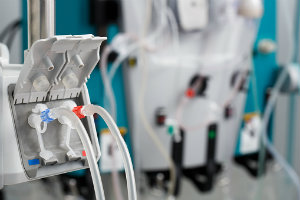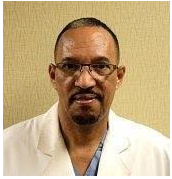Vascular Access Coordinator Interview: Forest Rawls
 Forest Rawls had his first kidney care experience while serving in the U.S. Navy as a transplantation technician in 1974. He held the following positions, operating room technician, plasmapheresis technician, hemodialysis technician, tissue bank technician and as a tissue and organ harvest procurement team member — but it was kidney care that really stood out to him.
Forest Rawls had his first kidney care experience while serving in the U.S. Navy as a transplantation technician in 1974. He held the following positions, operating room technician, plasmapheresis technician, hemodialysis technician, tissue bank technician and as a tissue and organ harvest procurement team member — but it was kidney care that really stood out to him.
Now, he’s a vascular access coordinator with Emory Healthcare Dialysis Clinics, a position he intends to hold until he retires.
We sat down with Forest to learn why he loves being a vascular access coordinator and what you should consider if you want to be one.
The vascular access coordinator position is fairly new. How can a clinic benefit from having one on staff?
At Emory Healthcare, you have a person — or in this case, persons, the two of us streamline access care. Improve outcomes, and educate patients and staff on all access issues. We are very familiar with all of our patients' accesses, we know the idiosyncrasies about the access, we know who the cannulation teams are in each clinic.
We also know what types of access the patient has so we can make recommendations on when, how and who will cannulate. Also, when there are problems, we can identify where to specifically send the patient with the guidance of the surgeons. We can actually send the patient to the appropriate place for the appropriate procedures at the appropriate time.
The clinic staff know they can count on us to intervene expeditiously to make sure the patient team is in the appropriate place at the appropriate time. They know to call us and we'll take care of it right away.
How do you think patients perceive you and your fellow vascular access coordinator?
The patients are happy we’re there because they know right from the beginning they can count on us to make sure they get to their designated place in the appropriate fashion. We take the initiative when we have to — we arrange the transportation. We go above and beyond.
Have patient outcomes improved with the use of vascular access coordinators?
Definitely, yes. Our AVF rates have increased and our Long Term Catheter rate has decreased. For hemodialysis, you have to have access to the blood. So, if that's impeded in any way, it's a problem. Vascular access coordinators facilitate getting patients back on the machines with the right access, corrected, expeditiously. The patients like it because we don't make them wait. We don't try to make you have an appointment two weeks down the road. We try to get you that day or the next day to get in, get the problem solved and come back on dialysis. Sometimes in fact, in the morning a patient can have a problem with his access and then come back in the same day. We can do that.
If someone wants to become a vascular access coordinator, what should they know?
First, know hemodialysis. Second, understand some things about access. Third, they should be a very decent to a great technical cannulator.
And know that once you convert from working on the floor, if you do access, it's 100 percent access so it takes a while to assimilate. The emphasis has to be on the access.
Vascular access coordinators do it all. We collect, track, trend. We educate patients. We talk to the surgeons. We communicate with everybody.
What do you like best about your job?
My favorite thing is having the ability to make a profound effect on what really happens with the patient’s access. Knowing we have all the support we need is essential: the physician backing from the nephrologist and from our interventional nephrologist and from our management team, they specifically hired us to do the job.




